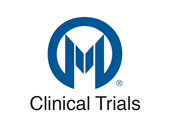Mokenge P. Malafa, MD
Senior Member, Department of
Gastrointestinal Oncology
Moffitt Cancer Center
12902 Magnolia Drive
Tampa, FL 33612
Mokenge.Malafa@moffitt.org
Tel: 813-745-1432
Fax: 813-745-7229

We are dedicated to the chemoprevention of GI cancers with a focus on pancreatic and colorectal cancers. The development of chemoprevention agents for GI cancers is an area of intense investigation and considerable promise. Bioactive micronutrients play a prominent role against tumor initiation and progression and therefore are leading chemoprevention agents for a broad spectrum of human malignancies. Despite an increasing number of combination chemotherapy strategies, the prognosis for patients with GI cancers remains poor. Our long-term goal is to improve the outcome and survival of patients by integrating an effective bioactive micronutrient such as vitamin E δ-tocotrienol (VEDT), into the current treatment paradigm of patients to impair tumor development and metastases. Our central hypothesis is that supplementation with VEDT will reduce the risk of tumor relapse for a defined subpopulation of GI cancer patients that are dependent on oncogenic signaling targeted by VEDT.
Lab News
August 31, 2016. Our manuscript demonstrating that combining radiomic features with miRNA classifier may improve prediction of malignant pathology of pancreatic intraductal papillary mucinous neoplasms was published in Oncotarget.
August 5, 2016. Our manuscript demonstrating that knockdown of CSE 1L gene in colorectal cancer reduces tumorigenesis in vitro was published in American Journal of Pathology.
August 1, 2016. Our manuscript demonstrating that increased expression of the glucose transporter type 1 gene Is associated with worse overall survival in resected pancreatic adenocarcinoma was published in Pancreas.
July 20, 2016. Our manuscript demonstrating that increased neutrophil-to-lymphocyte ratio after neoadjuvant therapy is associated with worse survival after resection of borderline resectable pancreatic ductal adenocarcinoma was published in Surgery.
July 15, 2016. Our phase I pharmacokinetic and safety trial of Vitamin E δ-tocotrienol after single and multiple doses in healthy subjects with measurement of vitamin E metabolites was published in Cancer Chemotherapy Pharmacology.
March 15, 2016. Our manuscript on the effect of metformin use on survival in resectable pancreatic cancer was published in PLoS One.
March 1, 2016. Our manuscript demonstrating that metabolic activity by 18F-FDG-PET/CT Is prognostic for stage I and II pancreatic cancer was published in Clinical Nuclear Medicine.
November 15, 2015. Our phase I safety, pharmacokinetic, and pharmacodynamic presurgical trial of Vitamin E δ-tocotrienol in patients with pancreatic ductal neoplasia was published in EBioMedicine.
September 15, 2015. Our manuscript that identified miRNAs as biomarkers of high-risk pancreatic cysts: a possible holy grail for the early detection of pancreatic cancer was published in Cancer Prevention Research.
September 1, 2015. Our manuscript demonstrating that triciribine phosphate monohydrate, an AKT Inhibitor, enhances gemcitabine activity in pancreatic cancer cells was published in Anticancer Research.
August 15, 2015. Our manuscript demonstrating aprognostic fifteen-gene signature for early stage pancreatic ductal adenocarcinoma was published in PloS One.
August 1, 2015. Our manuscript demonstrating that EGR-1/Bax pathway plays a role in vitamin E δ-tocotrienol-induced apoptosis in pancreatic cancer cells was published in the Journal of Nutritional Biochemistry.
July 1, 2015. Our manuscript demonstrating that the selective nuclear export Inhibitor KPT-330 enhances the antitumor activity of gemcitabine in human pancreatic cancer was published in Molecular Cancer Therapeutics.
January 1, 2015. Our manuscript that identified biologically-meaningful microRNAs that distinguish between high-risk and low-risk intraductal papillary mucinous neoplasms of the pancreas was published in PloS One.
October 1, 2013. Our manuscript demonstrating that Vitamin E δ-tocotrienol prolongs survival in the LSL-KrasG12D/+;LSL-Trp53R172H/+;Pdx-1-Cre (KPC) transgenic mouse model of pancreatic cancer was published in Cancer Prevention Research.
June 1, 2013. Our manuscript demonstrating that Vitamin E δ-tocotrienol induces p27(Kip1)-dependent cell-cycle arrest in pancreatic cancer cells via an E2F-1-dependent mechanism was published in PloS One.
April 1, 2013. Our manuscript demonstrating prolonged survival and delayed progression of pancreatic intraepithelial neoplasia in LSL-KrasG12D/+;Pdx-1-Cre mice by vitamin E δ-tocotrienol was published in Carcinogenesis.
March 1, 2012. Mike Kongynumy USF Medical Student will be joining the lab in the summer; he will be working on the oncogenic effects of k-RAS in pancreatic cancer as a component of the USF Scholarly Concentration Program
February 20, 2012. Four new research abstracts were accepted for presentation at the AACR annual meeting to take place in Chicago in April 2012.
January 20, 2012. Anying Zhang is joining the School of Life Science and Technology, University of Electronic science and technology of China in Chengdu as assistant professor after working in the lab for 1 year.
January 10, 2012. The clinical trial for healthy subjects with Vitamin E δ-tocotrienol “A Phase I Dose-Escalation Study of the Safety and Pharmacokinetics of Vitamin E δ-tocotrienol Following Multiple Dose Administration in Healthy Subjects” was open to accrual.
December 10, 2011. Our manuscript demonstrating that VEDT augments the antitumor activity of gemcitabine and suppresses constitutive NF B activation in pancreatic cancer was published in Molecular Cancer Therapeutics.


